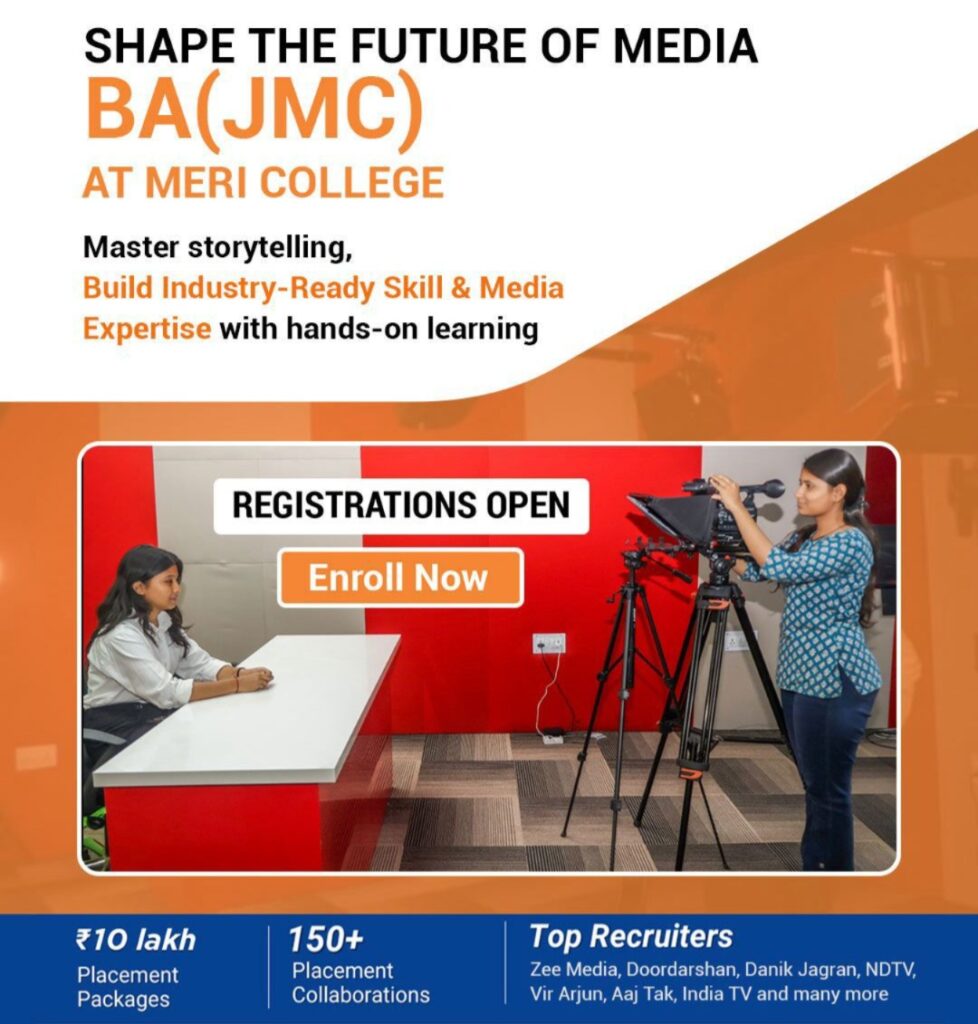In a world where stories influence perspectives, content drives economies, and visuals spark global trends, journalism and mass communication have emerged as more than just professions. They are now essential instruments of cultural dialogue, political discourse, and market strategy. For those who possess a passion for storytelling, creativity, and communication, pursuing a Bachelor of Arts in Journalism and Mass Communication BA(JMC) can be the first step toward a career filled with impact and purpose. Aspiring communicators no longer see media as a fallback option. Instead, it has evolved into a deliberate career choice driven by curiosity, digital fluency, and a sense of social engagement. The journey from being an enthusiast to a professional communicator begins with the right educational foundation.
Passion for Storytelling
Behind every powerful headline, every compelling documentary, and every trending post is an individual whose passion for communication drives them. Students entering a BA(JMC) program are often driven by an urge to ask questions, explore perspectives, and engage audiences. They’re not just looking for a job — they’re looking to create impact. This passion needs nurturing. Institutions that recognize and elevate individual voice, creativity, and critical thinking become catalysts in shaping media professionals who are not only skilled but also responsible and relevant.
Academic rigor meets Creative Energy
While creativity is the soul of media, it flourishes best when combined with structured academic guidance. A comprehensive BA(JMC) curriculum integrates theoretical concepts such as media ethics, political communication, development journalism, and visual culture with practical modules like photojournalism, television production, public relations, and content creation.
Institutes like Management Education and Research Institute stand out as they offer not just knowledge but immersive learning experiences. Recognized as the top BA(JMC) institute in Delhi NCR, MERI College blends academic rigor with progressive tools such as leadership stimulation modules that help students mirror real-world media scenarios.
Students are not only trained in traditional forms of communication but are also exposed to new-age skills through data analytics simulations, marketing strategy exercises, and digital content labs. These academic features help students make informed decisions, conduct ethical reporting, and strategize communication with precision.
Practical Immersion and Industry readiness
Theory must meet practice. This is where simulation-based learning and industrial immersion come into play. MERI College, for example, ensures its students experience the real-world workings of the media and communication industry through new venture simulation exercises, marketing stimulation, and hands-on exposure to industry projects. Industrial visits allow students to observe media houses, broadcasting networks, publishing setups, and production studios closely. These visits are not mere field trips but interactive engagements where students ask questions, analyze workflows, and network with professionals.
In addition to academic tools, MERI E-learning, LMS platforms, and ERP systems ensure continuous and organized learning. Students get real time feedback, curated learning resources, and the flexibility to revisit key concepts. The focus on industrial integration, through value-added courses with practical exposure, positions students as job-ready from day one.
Growth beyond the Classroom

Media professionals are often required to be spontaneous, culturally sensitive, and expressive. This growth is cultivated through exposure to diverse extracurricular activities. At MERI College, students engage in intensive club activities, ranging from filmmaking clubs to photography collectives, PR clubs, and media debates. Art-integrated learning fosters innovation, helping students connect storytelling with visual culture. Whether it’s through street plays, creative writing workshops, or multimedia presentations, students develop multi-dimensional thinking. Annual cultural events further allow students to showcase talent, collaborate across departments, and experience leadership roles. The institute’s location, nearest to the metro station, ensures accessibility, which encourages higher participation in such events and extends learning beyond the campus walls.
MERI College’s vibrant student life is supported by a legacy of over 15,000 alumni who actively engage with current students. Final-year students benefit from PDPS programs and pre-placement one-on-one mentoring, enabling a seamless transition from academia to employment.
The Future of Communication Professionals
With global connectivity redefining communication patterns, aspiring media professionals must look beyond local narratives. International exposure, made possible through educational trips and collaborations with 30+ international institutions, provides students with a cross-cultural understanding of media trends.
MERI College’s placement-ready approach is rooted in both skill development and strategic networking. The research centre fosters inquiry-led learning, encouraging students to pursue evidence-based journalism and academic exploration. Smart-screen enabled classrooms, modern infrastructure, and continuous faculty mentoring further elevate the academic journey.
Students graduating from the BA(JMC) program are not limited to newsroom roles. They venture into digital marketing, brand strategy, political consultancy, event management, and more. With higher education assistance readily available, they can even pursue specialized master’s degrees or research opportunities in media studies, communication theory, or digital innovation.
Conclusion
Choosing to pursue a BA(JMC) is not just an academic decision — it is a commitment to narrating the world as it is and envisioning it as it could be. For students who are inquisitive, creative, and committed to the craft of communication, this journey is not just educational, but deeply personal and professionally rewarding. Institutes that offer not only knowledge but also the infrastructure, exposure, and mentorship to support growth are key to turning passion into profession. Management Education and Research Institute, recognized as the top BA(JMC) institute in Delhi NCR, exemplifies such an environment where classroom learning meets field practice, where stories are crafted with responsibility, and where dreams are given the space and structure to become reality.

Fill out the form to connect with our BA(JMC) experts today!
Previous Article


